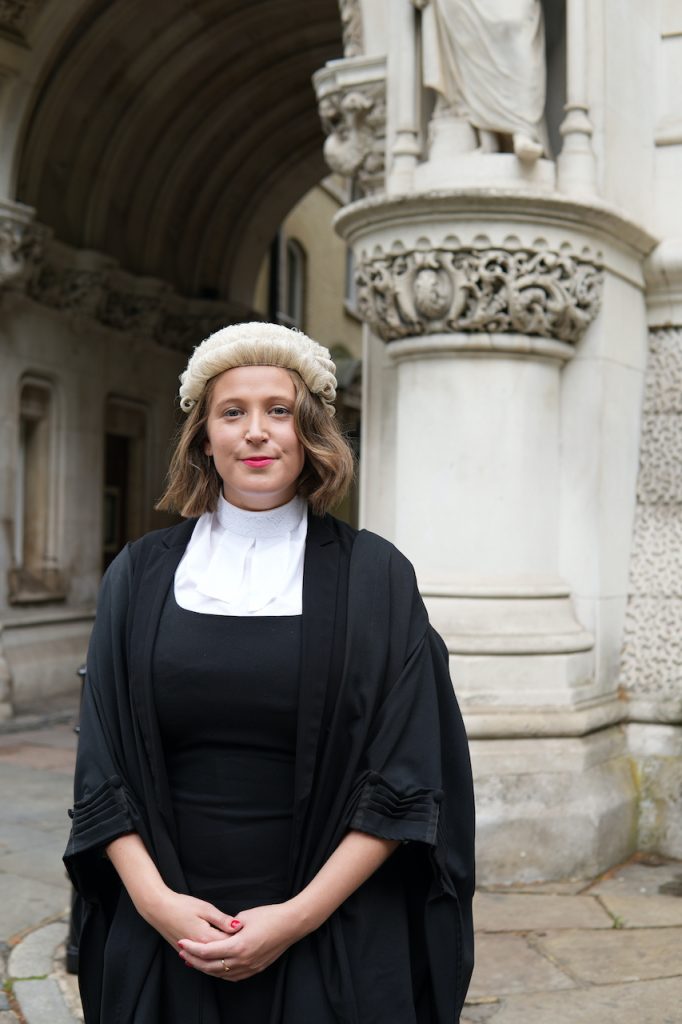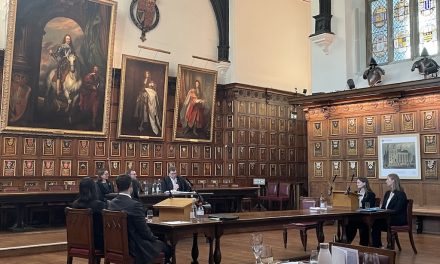As the lucky recipient of the Middle Temple Anglo-American Scholarship, I was fortunate to have the opportunity to visit Iowa on my recent trip to the United States. Under the generous stewardship of Master Nick Critelli, I had a crash course in the American judicial system. There were quite a few highlights, not to mention the burger I had at the Hamburg Inn as a West Wing fan, but I had some key observations from my time in the States. For the purposes of this article, I want to discuss my time in Federal Court, Jail Court, and the Family Courts.
One of my aims for applying for this scholarship was to properly understand the de jure federalist system and how it plays out in state and federal courthouses. Whilst living in Wyoming, I was perplexed by the fact that in neighbouring Colorado cannabis was being sold over the counter and yet remained federally illegal. Under the guidance of Judge CJ Williams, a District Judge for the Northern District of Iowa, I came to understand the importance of state sovereignty which helped elucidate this.
Judge Williams was extremely kind in walking me through the federal courthouse and introducing me to every member of the team: from probation officers to the Court of Appeal justices. Aside from receiving a pin from the US Marshall so that I could live out my Ennio Morricone fantasy, the highlight of my 12-hour day with Judge Williams was being able to chat to someone at every stage of the judicial process. In terms of comparison, I think my single biggest takeaway was quite how much money the federal system has at its disposal. The 99.6% federal court conviction rate is clearly a product of seemingly limitless resources, but also the selectiveness of the grand jury system – something which avoids any waste of public funds.
Back in Des Moines, Judge Brendan Greiner was kind enough to allow me to shadow him around Jail Court on one lovely Saturday morning. Personally, visiting an American jail was not at the top of my bucket list, but it was enlightening. During the tour I had from the detention officers, I learned that Polk County Jail is the largest mental health provider in the state. Moreover, although the accommodations were akin to the worst youth hostel I’ve ever seen, I also discovered that you must pay $85 per day for the privilege of being incarcerated.
As Judge Greiner tore through his docket of people who had been arrested on a Friday evening, I was most intrigued by the number of alcohol and drug-related offences. The whole process left me somewhat shell-shocked by the time we broke for lunch, notwithstanding the 18g of fentanyl discovered in the holding cell. Whilst ruminating on the 1000-person strong jailhouse, my mind went to my travel insurance and whether I would be covered in the event of an incident after I voluntarily walked into an American jail…
Having found the criminal side of things to be far more Saul Goodman than Atticus Finch, I was also fascinated to witness some family disputes at the state level. The Art Deco fan in me was finally satisfied with the 1930s Linn County Courthouse, which features Grand-Central-Terminal-esque grandeur, a far cry from the impressively modern federal courthouse. Given the contentiousness of vaccination in the United States, I was also captivated by some of the disputes happening between separated parents regarding Covid-19 injections for their children.
Additionally, back in Polk County, I had a series of fascinating conversations in the Youth Law Center. This, in addition to my time observing Master Critelli conduct a personal injury mediation, was a vital learning experience to further develop my understanding of American jurisprudence. As with our own adversarial court system, the Manichaeism of criminal proceedings was palpable, however, I saw a much more communal approach to youth justice proceedings. I was notably impressed by the manner of the judges and was reminded of the recent UK case, where Judge John McKendrick KC wrote a letter to two children regarding their parents’ divorce settlement in Ms D v Mr D [2022] EWFC 164.
Overall, the trip was an incredible learning experience and galvanised my commitment to a career in law. It was a privilege to represent Middle Temple and build upon the Inn’s international networks. I encourage anyone reading this to consider applying for the scholarship, and I am more than happy to go into more detail or even provide you with some Airbnb recommendations! Thank you to all those who were so generous with their time, experience, patience, and guidance. I would like to particularly thank Master Critelli, Judge Williams, Judge Greiner, and Joe Peiffer.
‘It was a joy to host Ms Tickle for several days at the Polk County courthouse and jail.
‘Ms Tickle’s observations of drug and alcohol abuse are accurate. Many of our defendants have court cases that stem from some form of substance abuse. In one such hearing, Ms Tickle overheard me say to the lawyers that a defendant’s companion was ’tweaking’. I explained that ’tweaking’ was American slang for a person actively exhibiting signs of recent methamphetamine ingestion. Sadly, I see this quite often in the courtroom. These cases take the form of simple possession to other criminal activity incidental to the abuse. Users are more prone to commit property crimes to support the habit or engage violent behaviour while under the influence. This unfortunately highlights the dearth of treatment options available in our area.
‘Methamphetamine is the dominant illicit drug we see, but the most dangerous by far is fentanyl. Abuse of fentanyl often leads to very tragic endings. Sadly, I see probation (community order) reports in cases where a defendant I previously sentenced has since died from an unintentional overdose. As mentioned by Ms Tickle, if those 18g of fentanyl found its way into the jail’s general population there is no telling the extent of possible devastation.
‘Which brings me to Polk County Jail Court. Being the most populous county in the state, we typically see 40 to 60 people every morning from the previous evening’s arrests. If the defendants cannot post bail, the law entitles them to see a judge within 24 hours. My job is to sift through each case file in a fair and efficient manner whilst determining release conditions, appointing defence lawyers, and setting future court dates. On any morning I might see crimes as varied as petty thefts and public intoxication to grave crimes like murder and kidnapping. For many people I see for jail court, this hearing coincides with a great deal of personal shame having just been arrested and accused of a crime. I do my best to not exacerbate that feeling, as I am aware my words could profoundly affect their emotional state. It is also important for lawyers like Ms Tickle to witness this bewildering daily event and learn how these hearings occur. Afterward, she was able to ask questions of our team of highly trained professional court clerks, pretrial release officers, and detention officers who pull off this feat day-in day-out.
‘To the surprise of Ms Tickle (and I imagine most people), our county sheriff charges a civil fee for staying in jail. This fee is a contentious subject of debate for criminal justice reform and is not uncommon in the states. In Iowa, most people cannot afford the jail bills. They largely remain uncollected, but unfortunately persist as civil judgements. Instead, our laws rightly give preference for repayment of victim restitution over other ancillary costs such as jail fees and fines.
‘Just like Ms Tickle, the invitation to visit our courts in Iowa is open to all future barristers of Middle Temple. Our work in these courtrooms is often grim, but nevertheless essential to our communities. I am always happy to share this world with aspiring lawyers so that we can continue to learn from each other.
‘(I have one disagreement with Ms Tickle. I once stayed a night in a sketchy hostel in Galway. Without question, our county jail has significantly better accommodations!)’
Judge Brendan Greiner

Hannah is a future pupil at Pump Court Chambers. She graduated with a distinction from the BTC in 2022. Previously, she was teaching and spent two years studying and lecturing at the University of Wyoming. She is currently Project Coordinator for an asylum seeker drop-in based in North London.

Brendan Greiner is a district associate judge for Iowa, United States. He presides over criminal court, jury trials, and magistrate appeals. Before taking the bench in 2018 he was a career prosecutor who specialised in financial crime and vehicular homicide. He also recently became a solicitor for England and Wales. He would have loved to join the Bar but could not take the year off from his judicial duties for pupillage. Prior to 2023 Judge Greiner’s only connection to the United Kingdom was that he comes from the same hometown in Iowa as Bill Bryson.




